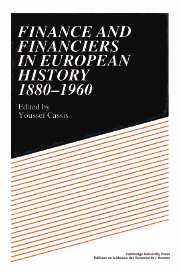Book contents
- Frontmatter
- Contents
- List of figures
- List of tables
- Preface
- 1 Introduction: the weight of finance in European societies
- 2 Banking and industrialization: Rondo Cameron twenty years on
- Part I FINANCIAL SECTOR AND ECONOMY
- Part II FINANCIAL ELITES AND SOCIETY
- 7 Financial elites and British society, 1880–1950
- 8 Bankers in French society, 1860s–1960s
- 9 The banker in German society, 1890–1930
- 10 Financial elites and society: comments
- Part III FINANCIAL INTERESTS AND POLITICS
- Part IV FINANCE AND FINANCIERS IN SMALLER EUROPEAN COUNTRIES
- Part V THE RISE OF EXTRA-EUROPEAN FINANCIAL CENTRES
- Index
9 - The banker in German society, 1890–1930
Published online by Cambridge University Press: 12 January 2010
- Frontmatter
- Contents
- List of figures
- List of tables
- Preface
- 1 Introduction: the weight of finance in European societies
- 2 Banking and industrialization: Rondo Cameron twenty years on
- Part I FINANCIAL SECTOR AND ECONOMY
- Part II FINANCIAL ELITES AND SOCIETY
- 7 Financial elites and British society, 1880–1950
- 8 Bankers in French society, 1860s–1960s
- 9 The banker in German society, 1890–1930
- 10 Financial elites and society: comments
- Part III FINANCIAL INTERESTS AND POLITICS
- Part IV FINANCE AND FINANCIERS IN SMALLER EUROPEAN COUNTRIES
- Part V THE RISE OF EXTRA-EUROPEAN FINANCIAL CENTRES
- Index
Summary
Two images come to mind when we consider the German banker of the Imperial and Weimar eras. One is that of the patrician, the bourgeois aristocrat. Fritz Stern has done much to create another image, namely that of the ‘pariah merchant-prince’, the Jewish banker exploited by the aristocratic ruling class of Prussia. Since Jews played a major role in banking, Stern's thesis must be carefully considered, discussing the extent of Jewish over-compensation and feudalization. But were Jewish bankers basically different from non-Jewish bankers? The great economic successes of the German business elite transformed Germany in the late nineteenth century into the most dynamic economic power in Europe and helped the business elite consolidate its wealth, economic power and prestige within German society. Characteristic of the Wilhelmine era were growing business influence on government, engraved in public memory by the Kaiser's meetings with businessmen, the rise of materialistic values and dreams of colonial grandeur, which could (among other things) provide German business with new opportunities for expansion.
Did a unified business elite emerge in this era, or did bankers constitute a distinct economic elite? Did Jewish bankers fully share in this triumphal march of German capitalism? This essay will explore the social barriers and links between banking on the one hand and industry and commerce on the other. It will look at the relationship between the various segments of the business elite and the rest of the upper class – especially the aristocracy, the political elite and state officials.
- Type
- Chapter
- Information
- Finance and Financiers in European History 1880–1960 , pp. 161 - 186Publisher: Cambridge University PressPrint publication year: 1991
- 1
- Cited by

